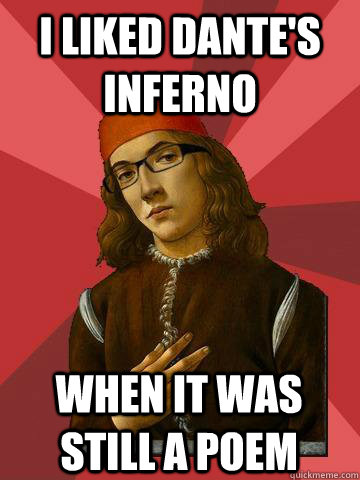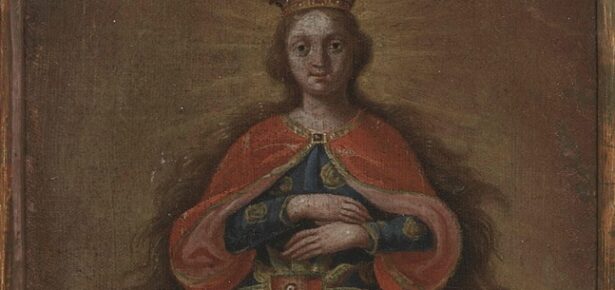“Hipster Stefano” became a popular internet meme format in 2011, featuring medieval characters like Dante as seen above. —”I liked dante’s inferno when it was still a poem,” quickmeme, 2011 (retrieved February 6, 2024)
“When was an embryo considered a person in the Middle Ages?”
“Medieval theologians described a tripartite process of ensoulment over the course of fetal development. The poet Dante Alighieri gives one of the most cogent explanations of this concept, which goes back to Aristotle, via Thomas Aquinas, Albertus Magnus, and others. Dante’s description of when God breathes life into the fetus takes place in the Divine Comedy on the sixth terrace of Purgatory. Dante’s Purgatory is imagined as an island-mountain organized according to the Seven Deadly Sins. On the terrace of gluttony, sinners circle past an offshoot of the Tree of Knowledge, which produces a delicious odor that makes them excruciatingly hungry and emaciated in appearance. Dante asks his two guides, the poets Virgil and Statius, how the disembodied spirits can become so thin if they do not need nourishment. Statius responds with a digression on sexual reproduction and embryology (Purgatorio 25.37-108) in order to account for the continuity between humans’ mortal bodies and their aerial bodies in Purgatory. He explains how the fetus takes shape and passes through three stages, first being endowed with a soul like that of a plant, and then with that of an animal, at which point the bodily organs are fashioned. Only after the articulation of the brain does God breathe into it a specifically human spirit, capable of self-reflection and speech. This new soul then combines with the two already inhabiting in the body, and after the person’s death, when the soul’s connection to the body is severed, it radiates around itself an ombra, a sort of shadow or mirror body that continuously reflects its inner condition.” —Olivia Holmes, “When was an embryo considered a person in the Middle Ages?,” Cambridge University Press, January 31, 2023 (retrieved December 30, 2023)
The Five Quintets (poetry)
 “In The Five Quintets, a poetic tour de force by Micheal O’Siadhail, Kavanagh’s quip is flavorfully borne out. Quintets offers a sustained reflection on Western modernity (and its yet unnamed aftermath) in the vein of The Divine Comedy, Dante’s sustained reflection on medieval Europe (and its aftermath, the Renaissance).
“In The Five Quintets, a poetic tour de force by Micheal O’Siadhail, Kavanagh’s quip is flavorfully borne out. Quintets offers a sustained reflection on Western modernity (and its yet unnamed aftermath) in the vein of The Divine Comedy, Dante’s sustained reflection on medieval Europe (and its aftermath, the Renaissance).
“O’Siadhail (pronounced O’Sheel) inspects 400 years of Anglo-Atlantic culture—artistic creativity, economics, politics, science, and ‘the search for meaning’—with the skillful hand of a citizen-poet, refracted through an Irish Catholic soul. Dublin born and educated, now poet in residence at Union Theological Seminary in New York, O’Siadhail embodies the vatic tradition of the Hibernian Gael—poet, prophet, priest, and, at times, jester.” [. . .] –Rose Marie Berger, SOJOURNERS, April, 2019.
Kayleen Asbo, The Soul’s Flame: A Musical Reflection of Dante’s Worlds
 In his epic poem the Divine Comedy, Dante Alighieri weaves Greek and Roman mythology, Italian history, and Christian legacy into a map that charts the journey of the human spirit from the depths of despair to the heights of beauty and love. In observance of the Lenten season, and in honor of the 750th anniversary of Dante’s birth, Numina Center for Spirituality and the Arts presents an experience of music, art, and story that emphasizes the profound, universal elements of Dante’s vision. We follow in the footsteps of his quest in Purgatorio for hope, healing, and community.
In his epic poem the Divine Comedy, Dante Alighieri weaves Greek and Roman mythology, Italian history, and Christian legacy into a map that charts the journey of the human spirit from the depths of despair to the heights of beauty and love. In observance of the Lenten season, and in honor of the 750th anniversary of Dante’s birth, Numina Center for Spirituality and the Arts presents an experience of music, art, and story that emphasizes the profound, universal elements of Dante’s vision. We follow in the footsteps of his quest in Purgatorio for hope, healing, and community.
This journey of hope and forgiveness begins at 5pm, with cultural historian Kayleen Asbo presenting art and story that charts Dante’s path through the Purgatorio. At 6pm, medieval music specialists Shira Kammen and Devi Mathieu, joined by Michelle Levy and the Dante Singers, present a program of music to lead us on that journey.
With music drawn from the medieval era and beyond, our journey crosses the boundaries of time, culture, and spirituality. The program features some of the most renowned pieces from the Middle Ages, with emphasis on works referenced in Dante’s poetry. Selections range from Gregorian plainchant and Hildegard of Bingen, to Carmina Burana and Cantigas de Santa Maria. The journey honors the common roots of all the traditions that trace their origins to the prophet Abraham by including songs and chants from Christian, Sufi, and Jewish traditions.
Philip Jonckheer will narrate our adventure. Audience members will have the opportunity to join in some of the chanting.
February 21, 5pm
Episcopal Church of the Incarnation, 550 Mendocino Ave, Santa Rosa CA
Suggested donation $25 at the door only
See: Numinia Center for Spirituality & The Arts


